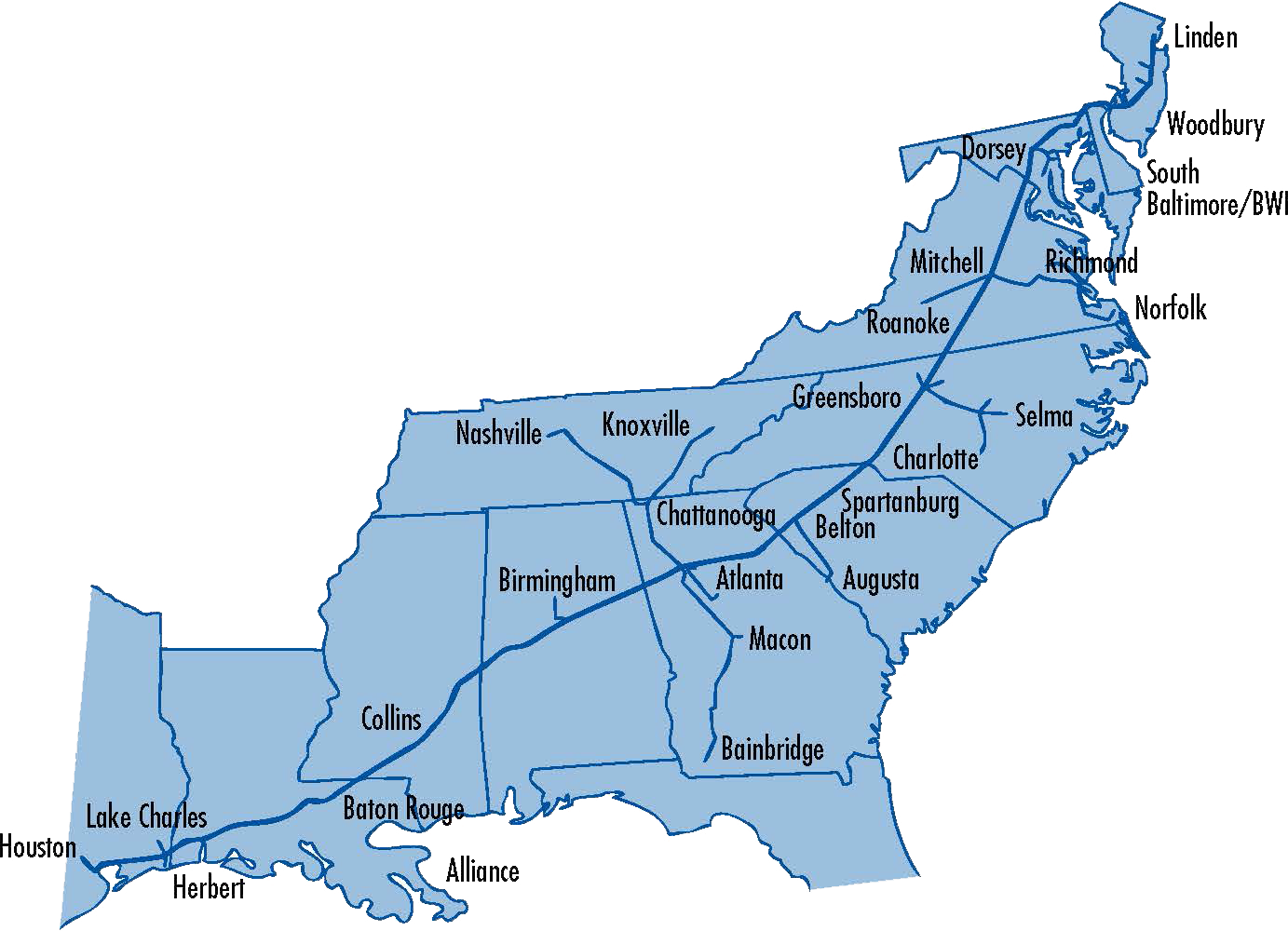A strategic interstate gasoline pipeline exploded in Alabama on Oct. 31, not far from the September spill site after an accidental strike by a track hoe, killing one and injuring five workers. Higher gas prices and long lines are anticipated.
The explosion in Shelby County caused the shutdown of the Colonial Pipeline that "begins in Houston, Texas and ends in Linden, New Jersey, traversing 11 other states along the way," according to the company.

Credit: Colonial Pipeline Company
"The blast on Monday occurred several miles from its biggest gasoline spill in nearly two decades in September," reports Devika Krishna Kumar for Reuters. "That spill caused a 12-day interruption in the flow of about 1.3 million barrels per day of the fuel from the refining hub on the Gulf Coast to the Northeast."
The shutdown will restrict gasoline supplies to millions of Americans in the Southeast and possibly the Northeast. The Northeast could be less affected since it can get supplies via waterborne shippers.
The 5,500-mile (8,850-km) Colonial Pipeline is the largest U.S. refined products pipeline system and can carry more than 3 million barrels of gasoline, diesel and jet fuel between the U.S. Gulf Coast and the New York Harbor area.
According to a press release by Alabama Gov. Robert Bentley on Tuesday, the contractor was performing work "to install a permanent repair required by the previous pipeline rupture on September 9, 2016."
The fire was still burning on Wednesday. Long lines and higher gas prices are anticipated in inland markets in the U.S. Southeast, which do not have access to ports, similar to what happened in September after the spill.
North Carolina Governor Pat McCrory took action to dispatch "fleets of gasoline tanker trucks from outside North Carolina [to make] deliveries across the state beginning today", according to his press release on Wednesday. "[T]he state gets 70 percent of its gasoline from the Colonial Pipeline," notes Kumar.
"Colonial said on Wednesday it still aimed to reopen the vital supply artery by Saturday, but added that the timetable might change as it gets updated information," report Kumar and Erwin Sebar on Wednesday. Price increases of 10 to 15 cents per gallon are anticipated according to GasBuddy.
Pipeline safety experts said while regulators will investigate the incident, the pipeline could resume service sooner than it did in September due to fewer uncertainties about the cause.
The pipeline is also a crucial conveyance of jet fuel for the East Coast market.
In an otherwise unrelated Reuters article on Colonial Pipeline, Kumar and Liz Hampton report that the company wants to change its jet fuel deliveries from a high-sulfur to a low-sulfur grade by 2018 which would result in higher fuel costs or airlines.
Colonial's plan is driven largely by waning demand for high-sulphur fuels. Railroad and marine transportation companies, for instance, are using less high-sulphur diesel fuel in response to environmental regulations.
Sulphur levels in jet fuel are not currently regulated, however, and the industry still uses high-sulphur fuels widely, in part because they have better lubricating qualities for airplane engines.
Also on Planetizen:
FULL STORY: Colonial may open key U.S. gasoline line by Saturday after fatal blast

Maui's Vacation Rental Debate Turns Ugly
Verbal attacks, misinformation campaigns and fistfights plague a high-stakes debate to convert thousands of vacation rentals into long-term housing.

Planetizen Federal Action Tracker
A weekly monitor of how Trump’s orders and actions are impacting planners and planning in America.

In Urban Planning, AI Prompting Could be the New Design Thinking
Creativity has long been key to great urban design. What if we see AI as our new creative partner?

Chicago’s Ghost Rails
Just beneath the surface of the modern city lie the remnants of its expansive early 20th-century streetcar system.

Baker Creek Pavilion: Blending Nature and Architecture in Knoxville
Knoxville’s urban wilderness planning initiative unveils the "Baker Creek Pavilion" to increase the city's access to green spaces.

Pedestrian Deaths Drop, Remain Twice as High as in 2009
Fatalities declined by 4 percent in 2024, but the U.S. is still nowhere close to ‘Vision Zero.’
Urban Design for Planners 1: Software Tools
This six-course series explores essential urban design concepts using open source software and equips planners with the tools they need to participate fully in the urban design process.
Planning for Universal Design
Learn the tools for implementing Universal Design in planning regulations.
planning NEXT
Appalachian Highlands Housing Partners
Mpact (founded as Rail~Volution)
City of Camden Redevelopment Agency
City of Astoria
City of Portland
City of Laramie




























